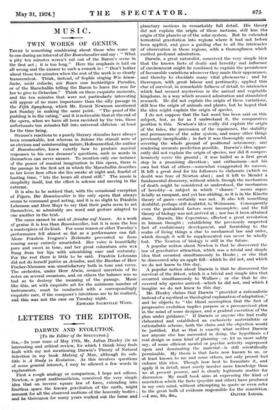MUSIC.
. TWIN WORKS OF GENIUS.
TriEaz is something maddening about those who come up to one during an interval of Der Rosen/cavalier and say : "What a pity ten minutes weren't cut out of the Baron's scene in the first act ; it is too long." Here the emphasis is laid on all wrong and the answer to such a remark is : "Don't bother about those ten minutes when the rest of the work is so clearly transcendent. Think, instead, of Sophie singing Wie himm- lische, nicht irdische, wie Rosen WM hochheiligen Paradies, or of the Marschallin telling the Baron to leave the rose for her to give to Octavian." Think on these exquisite moments, and the ten minutes that were not particularly interesting will appear of no more importance than the silly passage in the Fifth Symphony, which Mr. Ernest Newman mentioned last Sunday in making the same point. "The proof of the pudding is in the eating," and it is noticeable that at the end of the opera, when we have all been ravished by the trio, those unfortunate ten minutes fall into universal oblivion—at least for the time being.
• Strauss's reactions to a purely literary stimulus have always been remarkable, but whereas in Salome the stimuli were of an obvious and uninteresting nature,11ofmannsthal, the author of Rosen/cavalier, knew exactly how to produce musical responses to his own dreamer's questions, such as words in themselves can never answer. To mention only one instance of the power of musical imagination in this opera, there is the passage in the first act in which the Marschallin describes to her lover how often she lies awake at night and, fearful of hasting time, "lets the hours all stand still." The music is simplicity itself, but the effect is solemn and moving in the extreme.
It is also to be noticed that, with the occasional exception of Figaro, Der Rosen/cavalier is the only opera that always seems to command good acting, and it is no slight to Fraulein Lehmann and Herr Mayr to say that their parts seem to act themselves, so admirably are word and gesture adapted to one another in the text.
The same cannot be said of Ariadne.auf Naxos. As a work of genius it is less than Rosen/cavalier, but it is none the less a masterpiece of its kind. For some reason or other Tuesday's performance fell almost as flat as a performance can fall. Alone Fri,ulein Ivoguen's Zerbinetta prevented us from coming away entirely unsatisfied. Her voice is beautifully pure and sweet in tone, and her great coloratura aria was flung from her lips with astonishing ease and certainty. For the rest there is little to be said. Frii,ulein Lehmann did not do herself justice as Ariadne, and the Bacchus of Herr Fischer-Niemann was unsatisfactory both in tone and verve. The orchestra, under Herr Alwin, seemed uncertain of its notes on several occasions, and on others the balance was so bad as to destroy the meaning of the passage. Music like this, set with exquisite art for the minimum number of instruments, must be conducted with a correspondingly exquisite care, if the composer's intentions are to be realized, and this was not the ease on Tuesday night.
EDWARD SACKVILLE WEST.










































 Previous page
Previous page